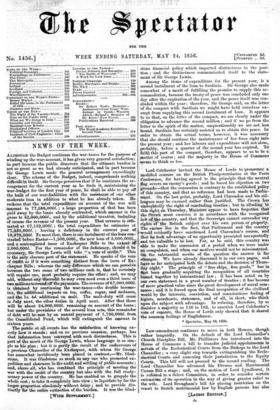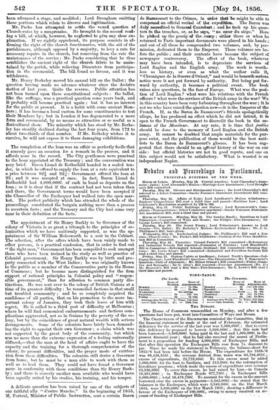Law-amendment continues to move in both Houses, though rather languidly.
On the default of the Lord Chancellor's Church Discipline Bill, Mr. Phillimore has introduced into the House of Commons a bill to transfer judicial• appointments in pertain of the Ecclesiastical Courts from the Bishops to the Lord Chancellor ; a very slight step towards 'extinguishing the Eccle- siastical Courts and annexing their jurisdiction to the Equity Courts. This bill will not proceed to the second reading. The Lord Chancellor has advanced his Divorce and Matrimonial Causes Bill a stage ; and, on the motion of Lord Lyndhurst, it is referred to a Select Committee, in order_to consider certain extensions of its operation in the way of giving greater relief 'to the wife. Lord Brougham's bill for placing restriction on the resort to Scotch matrimonial law by English persons has also
been advanced a stage, and modified ; Lord Brougham omitting those portions which relate to divorce and legitimation.
Mr. Packe has attempted to settle the vexed. question of Church-rates by a compromise. He brought to the second read- ing a bill, of- which, however, he neglected to giro any clear ex- planation. If we rightly apprehend, its purpose consists in af- firming the right of the church functionaries, with the aid of the parishioners, although opposed by a majority, to levy a rate for necessary repairs in the church, but removing from the rate the maintenance of the service ; Mr. Parke considering that he thus establishes the ancient right of the ehuroh fabric to be main- tained by the parish, while relieving Dissenters from participa- tion in the ceremonial. The bill found no favour, and it was withdrawn.
Mr. Henry Berkeley moved his annual bill on the Ballot ; the question having made no advance whatever since the decisive motion of last year. Quite the reverse. Public attention has not been turned upon these constitutional subjects : the ballot, like the suffrage, was a practical question some years back, and it probably will become practical again ; but it has no interest for the public at present. It is a habit with some ancient Mem- bers ; it has become a local custom for some constituencies to test their Members by ; but in London it has degenerated to a mere form and ceremonial, by no means so attractive or so useful as a itoricultural show. The minority which has stood by Mr. Berke- ley has steadily declined during the last four years, from 172 to about two-thirds of that number. If Mr. Berkeley wishes it to survive, he will not expose it to these damaging exhibitions.



































